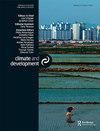Examining complementary relationships among climate change adaptation practices of rice producers in Chitwan, Nepal
IF 3.4
3区 环境科学与生态学
Q1 DEVELOPMENT STUDIES
引用次数: 1
Abstract
ABSTRACT This study examines how the complementary relationships among multiple climate change adaptation strategies (improved varieties, irrigation practices and direct-seeded rice, referred to as ‘DSR’) are influenced by access to Extension services, training related to farming practices and weather-related information (referred to as ‘institutional factors’). This study hypothesizes the influence of institutional factors and the resulting effects on their joint adoption using survey data collected from 359 rice producers in Chitwan district of Nepal in 2019. The results indicate: (1) adoption of all the three climate change adaptation practices are complementary to each other; (2) all three institutional factors enhance the likelihood of the adoption of variety, access to Extension and training enhances the likelihood of the adoption of improved irrigation, and information enhances the likelihood of the adoption of DSR and (3) access to Extension and training enhance the complementarities among all three pairs of adaptation practices (variety and irrigation; variety and DSR and irrigation and DSR), while information enhances the complementarity between variety and DSR only. The impact of complementary relationships among multiple climate change adaptation strategies influenced by the institutional factors is particularly valuable for policy makers and government agencies to allocate and prioritize resources.研究尼泊尔奇旺水稻生产者适应气候变化实践之间的互补关系
摘要本研究考察了多种气候变化适应策略(改良品种、灌溉实践和直播水稻,简称“DSR”)之间的互补关系如何受到推广服务、农业实践相关培训和天气相关信息(简称“制度因素”)的影响。本研究利用2019年从尼泊尔奇特万区359家水稻生产商收集的调查数据,假设了制度因素的影响及其对联合采用的影响。结果表明:(1)采用这三种适应气候变化的做法是相辅相成的;(2) 所有这三个制度因素都增加了采用品种的可能性,获得推广和培训的机会增加了采用改良灌溉的可能性,信息增强了采用DSR的可能性,(3)获得推广和培训增强了所有三对适应实践(品种和灌溉;品种和DSR以及灌溉和DSR)之间的互补性,而信息仅增强了品种和DSR。受体制因素影响的多种气候变化适应战略之间互补关系的影响对决策者和政府机构分配和优先考虑资源特别有价值。
本文章由计算机程序翻译,如有差异,请以英文原文为准。
求助全文
约1分钟内获得全文
求助全文

 求助内容:
求助内容: 应助结果提醒方式:
应助结果提醒方式:


